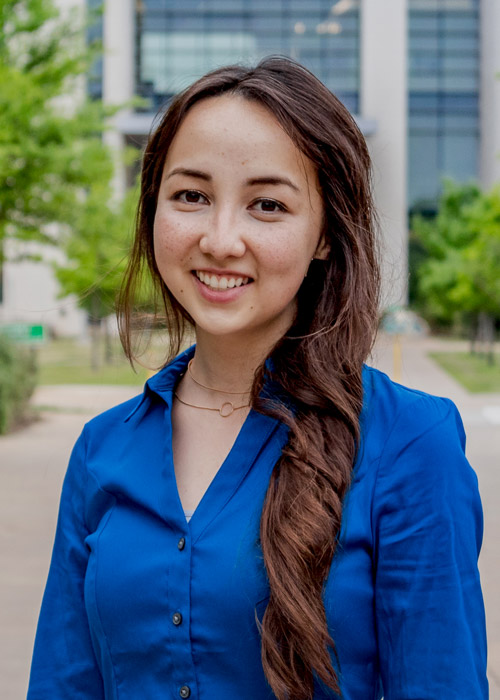As an artist and amateur photographer, Dorothy Mantle views her studies in mechanical engineering at The University of Texas at Dallas through a nontraditional lens.

Mantle, a senior in the Erik Jonsson School of Engineering and Computer Science, said such varied perspectives — the combination of engineering and artistry — often lead to innovation.
“An artist’s perspective, to me, means that you’re not confined by certain boundaries. Abstractions allow us to imagine what could be, without limitations,” she said. “This mindset, with preconceptions removed, enables innovation — revolutionary ideas to which we can apply our engineering understanding.”
Mantle is one of 11 current students and alumni of UT Dallas selected in 2020 for the National Science Foundation (NSF) Graduate Research Fellowship Program. The program provides a stipend and tuition support for students pursuing graduate studies in STEM fields — science, technology, engineering and math. The Collegium V Honors Program student plans to study mechanical engineering at Stanford University in the fall.
As an undergraduate, Mantle worked with Dr. Carlos Busso, associate professor of electrical engineering, in his Multimodal Signal Processing Laboratory, an environment she described as extremely supportive of her interdisciplinary approach to research.
NSF Graduate Research Fellowship Program
The National Science Foundation Graduate Research Fellowship Program is the nation’s oldest fellowship program that directly supports graduate students in various STEM (science, technology, engineering and mathematics) fields. This year, 2,076 awards were offered from more than 13,000 applicants. The award includes a three-year, $34,000 annual stipend plus a $12,000 educational allowance that goes toward tuition and fees.
“I worked on creating a regression model to predict a driver’s level of cognitive distraction — not visual distraction, but rather back-of-your-mind type of distraction — based on a person’s facial expression,” she explained. “This encompasses neural networks in an effort to increase overall vehicle safety.”
Mantle said being a UT Dallas student can open many doors. She credited her Collegium V curriculum, which included courses on topics from evolution to engineering ethics, with broadening her vision of what she could do. A summer semester spent in Nanjing, China, and internships with Raytheon Co. and Texas Instruments Inc. also expanded her world view.
“Going to Nanjing helped me understand that international connections for research, as well as personal and industry connections, aren’t as remote as I once thought,” she said. “During my internships, I was really pushed to think bigger and to be conscious of why we’re doing the things we are — devising something original. I’m very grateful for the corporate relationships that UT Dallas has nurtured.”
The NSF selected three other UT Dallas undergraduates expected to earn their degrees in May:
Wesley Brigner, an electrical engineering senior, has worked for three years with Dr. Joseph Friedman, assistant professor of electrical engineering, to develop next-generation hardware for machine learning systems. He will continue his studies at UT Dallas as a PhD student in the fall.
Molecular biology senior Mark De Los Santos, a Eugene McDermott Scholar and a 2019 Barry Goldwater Scholar, conducted neurodegenerative disease research at Harvard Medical School/Massachusetts General Hospital, University College London and Stanford University College of Medicine. De Los Santos will attend Columbia University as a doctoral student in neurobiology and behavior as a Dean’s Diversity Fellow.
Mechanical engineering senior Benjamin Weldon, also a Collegium V Honors student, participated in two NSF Research Experiences for Undergraduates (REU) programs that focused on nondestructive testing of materials and structures. Weldon will enter the aeronautics and astronautics engineering graduate program at Stanford in the fall and will focus on autonomous systems and decision-making.
Seven UT Dallas alumni also received NSF fellowships, including Austin Mordahl BS’18, a software engineering PhD student at the University who has been working with Dr. Shiyi Wei, assistant professor of computer science, since 2018. His research concerns the automatic detection of software bugs and sensitive data leaks.
Other alumni recipients are:
Keene Chin BS’18 was a Collegium V Honors student while earning his undergraduate degree in mechanical engineering at UT Dallas. He is now a doctoral student in robotics at Carnegie Mellon University.
Asim Gazi BS’18 majored in electrical engineering while at UT Dallas and is a second-year PhD student at the Georgia Institute of Technology. His research lies at the intersection of engineering, neuroscience and psychology. He is working to develop the next generation of noninvasive neuromodulation systems to assist people with anxiety disorders and emotional dysregulation.
Dana Jenkins BS’18 was a Collegium V Honors student at UT Dallas while earning her biochemistry degree. She attends UT Austin for her doctoral studies in biomedical engineering. She is working to improve the bone healing potential of synthetic polymer bone grafts. She also promotes STEM education in the Latino community.
Danny Lam BS’18 earned his undergraduate degree in biomedical engineering from UT Dallas. He is a doctoral student at Case Western Reserve University, where he is studying the effectiveness of targeted drug-delivery applications in mitigating brain implant-induced neuroinflammation.
Gino Occhialini BS’18, a 2017 Goldwater Scholar and award-winning teaching assistant, earned his chemistry degree from UT Dallas. He is in a doctoral program at the Massachusetts Institute of Technology working on the development and mechanistic study of new chemical reactions.
Vaughn Osterman BS’19 is a mathematics alumnus whose research has been published in the International Journal of Number Theory. His fellowship proposal involves research in dispersing billiards. He plans to attend the University of Maryland, College Park in the fall.